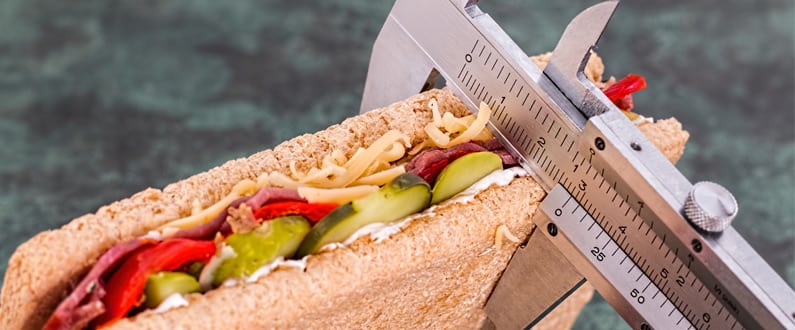Calorie counting is one popular way around the difficulties attached to eating less, and is a method very commonly used by those trying to lose weight.
The simple process behind losing weight is eating fewer calories than you burn. However, this may be more difficult than it first seems, which is why many people count calories to help track the foods they eat and the energy they burn.
What is a calorie?
A calorie is the unit that energy is measured in. Within food products, calories usually means the energy content of that particular food or beverage. It is widely accepted that, in order to lose weight, you need to eat fewer calories each day than your body burns.
Do calories matter?
You may hear that “calories don’t matter, so calorie counting is pointless”, but in terms of weight loss calories definitely do matter.
This has been proven repeatedly by studies in which people were asked to consume more calories than they burn, with the results showing that this inevitably leads to weight gain. [128]
It is a simple fact that limiting your calorie intake will be effective as a means of losing weight, provided that you stick to it consistently. One study found that calorie counting led to an extra 7lbs of weight loss when compared to dieters who did not count calories. [129]
How many calories do I need?
The number of calories that you should eat is unique to you, because it depends on factors such as age, weight, gender and activity levels.
As a general guideline, the average man should consume around 2,500 calories per day to maintain their weight, and 2,000 to lose 1lb per week. Women require slightly fewer, with 2,000 calories per day in order to maintain their weight and 1,500 to lose 1lb per week.
Measuring portion sizes
Over the last few decades it feels like portion sizes have been growing, with many restaurants now serving dishes that contain two or three times what the average person requires.
This has caused a phenomenon known as ‘portion distortion’ in which excessive servings of food are seen as the normal amount. [130]
When added to the fact that the majority of people aren’t particularly good at estimating calorie values of foods, this can cause weight gain. Calorie counting can be a vital way of avoiding this potential dietary minefield.
However, in order to make it work correctly, you’ll need to record food portions accurately, measuring food out with scales or cups.
Thankfully it’s not essential be spot-on with your measurements, you just need to be as accurate as possible. It’s especially important to be accurate when recording high-fat foods, as under-recording these will cause a huge difference between assumed and actual intake, because fat is more energy-dense than other macronutrients.
Can I eat anything I want when calorie counting?
Calories are an important part of tracking what you’re eating and helpful for losing weight. However, it doesn’t provide much of an insight into the quality of your diet. [131]
While eating fewer calories should make you lose weight, what you are eating is also highly important. 100 calories from cauliflower will affect you differently than 100 calories from chocolate, for example. [132]
Different foods will affect hunger and calories burnt in different ways, so it’s best to base your diet on high-quality whole foods that have been processed as little as possible.
These foods will provide numerous health benefits, while ensuring that it’s easier to consume fewer calories.




